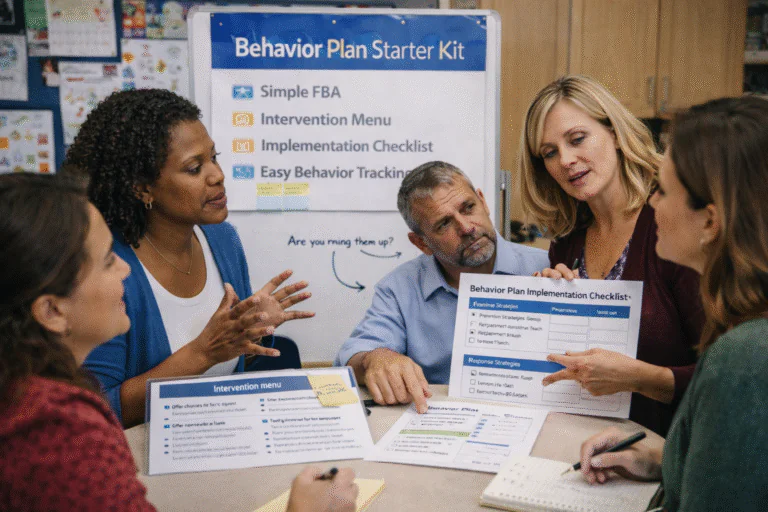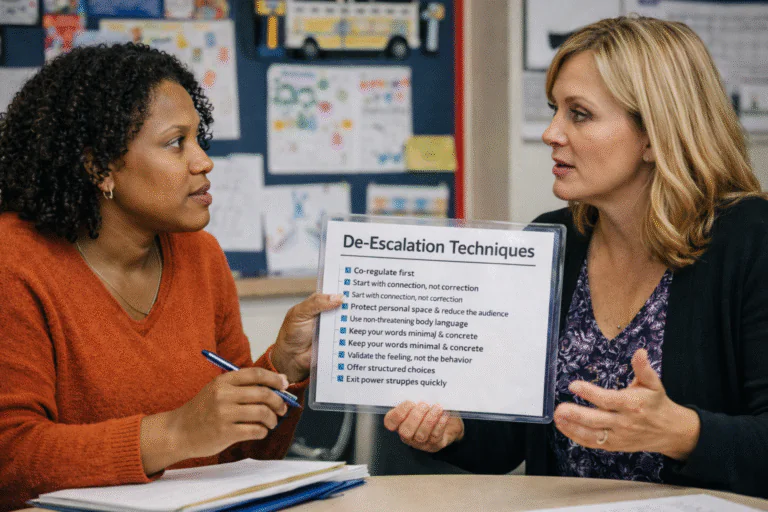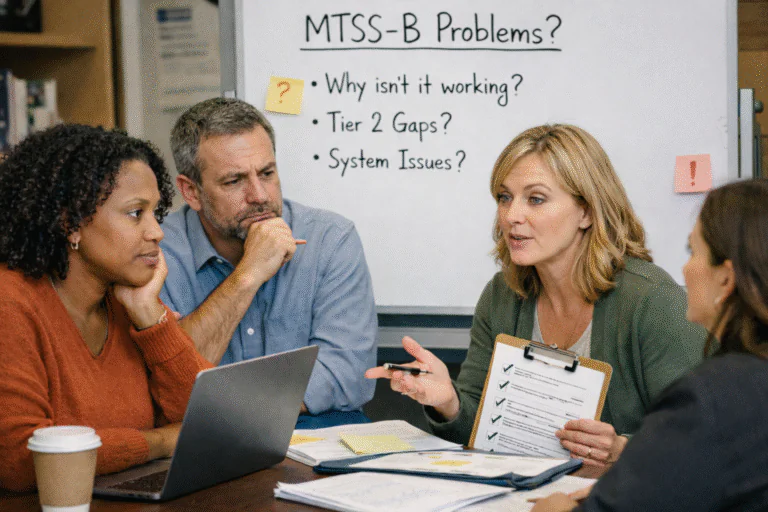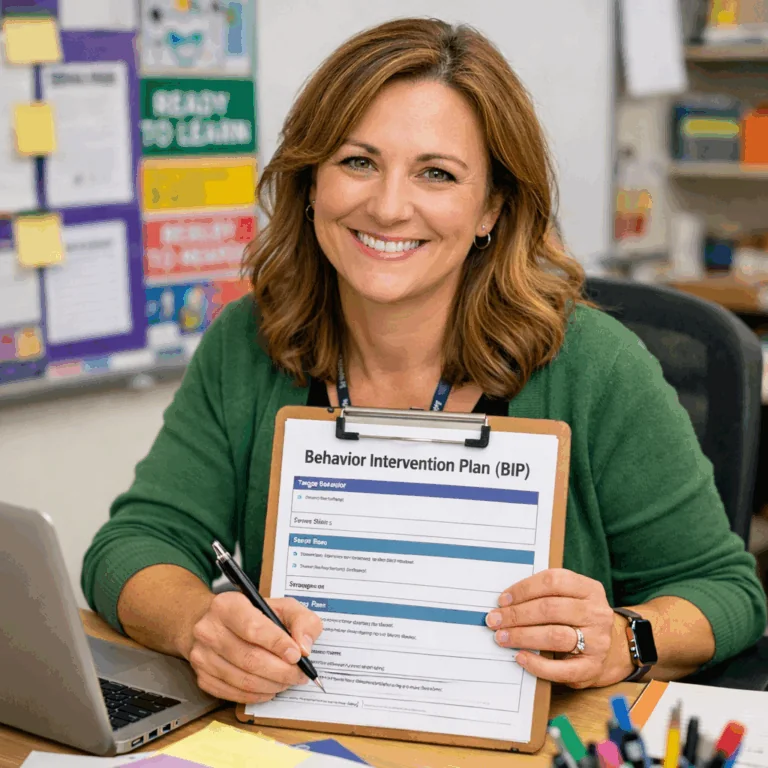1. Parent or Guardian
The parent or guardian is a required participant in every IEP meeting. This isn’t just a courtesy—involving parents is mandated by law.
Why It Matters:
- Parents offer unique, personal insight into their child’s personality, strengths, and challenges
- They see the student in different settings and circumstances professionals may not
- Their perspective helps create a more complete and accurate picture of the student’s needs
- Involving parents leads to stronger, more relevant IEPs tailored to real-life experiences
What They Contribute:
- Context about the child’s life outside of school
- Advocacy to ensure services meet real-world needs
- Consent and feedback on proposed goals, services, and placements
Even if the school cannot reach the parent, the effort must be made—and documented. This includes multiple attempts via phone calls, emails, and written notices. Offering virtual or phone attendance options is also best practice when in-person attendance isn’t possible.
Without proper documentation of these efforts, the IEP meeting may not meet legal requirements under IDEA.
2. At Least One General Education Teacher
(If the Child Is or May Be Participating in the General Education Environment)
Even if the student spends only part of their day in general education, having a general education teacher on the IEP team is still required. This member brings essential insight into grade-level expectations, classroom routines, and the supports necessary for success in a general education setting.
Why It Matters:
- General education teachers understand grade-level academic expectations, classroom routines, and peer dynamics
- They help ensure the IEP aligns with what’s happening day-to-day in the general education environment
- Their input supports planning for accommodations, modifications, and strategies that help the student succeed alongside peers
What They Contribute:
- Recommendations for accommodations within the general education setting
- Observations of student performance and behavior
- Collaboration strategies for co-teaching or inclusion support
Their presence helps ensure the student has meaningful access to the general curriculum and that supports are practical in the regular classroom environment.
3. At Least One Special Education Teacher or Provider
Special education teachers or providers bring specialized expertise to the IEP team, focusing on the unique learning needs of the student.
Why It Matters:
- Special education teachers bring deep knowledge of how to support students with diverse learning and behavioral needs
- They ensure IEP goals are targeted, measurable, and aligned with the student’s present levels of performance
- Their expertise shapes the specially designed instruction and services that help the student make meaningful progress
- They play a key role in tracking data and adjusting strategies based on how the student responds to interventions
Looking for help writing strong, measurable IEP goals? The Behavior Advantage IEP Goal Bank is here to make that process easier and more effective.
What They Contribute:
- Strategies for supporting academic and behavioral needs
- Development of accommodations and modifications
- Input on specially designed instruction and service delivery
In some cases, a related service provider (such as a speech therapist) may fulfill this role, but only if they are directly involved in delivering special education services.
4. A Representative of the School District (LEA Representative)
This member is typically a principal, assistant principal, or special education administrator. Their key role is to have the authority to allocate resources and make decisions during the IEP meeting.
Why It Matters:
- The LEA representative ensures that recommended services, supports, and placements are feasible and can be delivered
- They have the authority to approve staffing, funding, and resources on the spot, keeping the IEP process moving forward
- Their presence ensures the IEP aligns with district policies and complies with state and federal special education laws
- Without an authorized decision-maker, the team cannot finalize critical parts of the IEP, delaying support for the student
What They Contribute:
- Approval of staffing, services, and equipment needed
- Knowledge of district policies and special education procedures
- Assurance that the IEP complies with state and federal regulations
It’s not enough for someone to simply attend the meeting; they must be able to commit resources.
5. An Individual Who Can Interpret the Results of Evaluations
This person might already be on the team (like a school psychologist or special education teacher), as long as they are qualified to explain evaluation results and their instructional implications.
Why It Matters:
- Evaluation results are essential for determining eligibility and identifying a student’s unique strengths and needs
- A qualified professional ensures the team understands what the data actually means—not just what the numbers say
- Their interpretation directly informs IEP goals, services, and placement decisions based on evidence, not assumptions
- Without this input, the team may miss key learning or functional needs that impact the student’s success
If you want to learn more about writing IEP goals, check out our dedicated guide.
What They Contribute:
- Interpretation of test scores and academic or functional data
- Explanation of how evaluations inform service and placement decisions
- Insight into how the student’s disability impacts learning
Having this expertise ensures the team’s decisions are based on solid data—not just observations or assumptions.
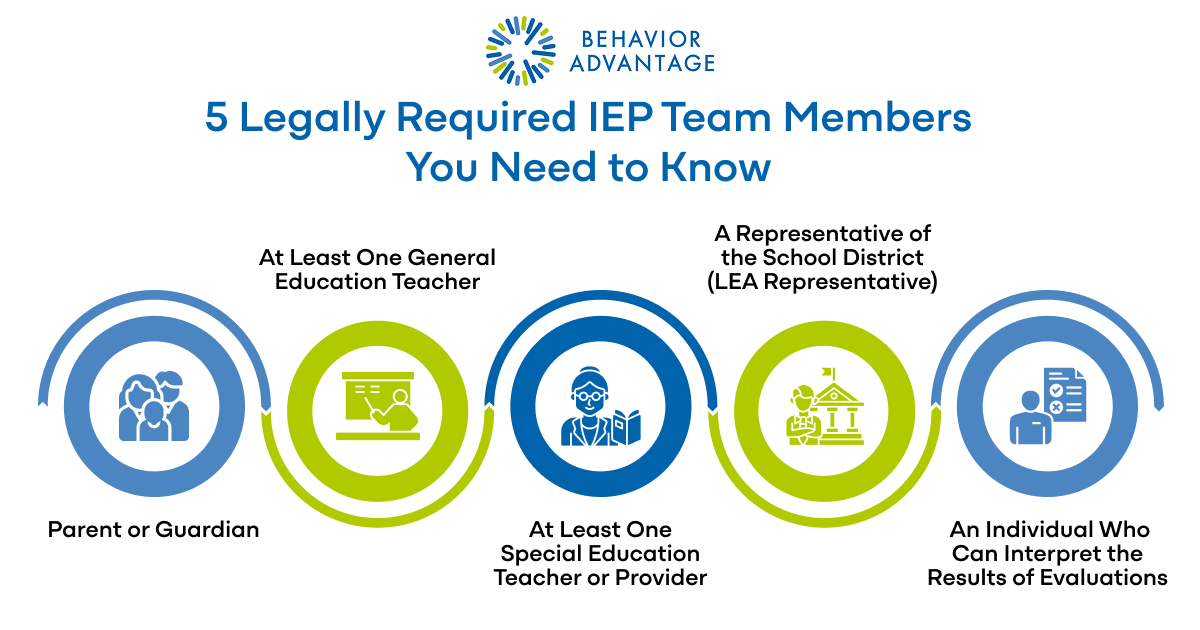
Why These Roles Are Required—and What Happens If One Is Missing
Under IDEA, each of these roles is considered essential to the development of a compliant and meaningful IEP. If any one of these required members is absent without appropriate documentation or consent to excuse, the IEP may be considered procedurally invalid.
Additional Team Members (Optional but Often Helpful)
While the five members above are mandatory, the IEP team can also include:
- Related service providers (e.g., speech/language pathologists, occupational therapists)
- Transition coordinators (especially for students aged 16+)
- Behavior specialists
- Educational advocates or legal representatives
- The student (particularly in secondary transition planning)
Each of these members can bring valuable perspective and help round out the team’s understanding of the student’s needs.
If you want to find out more about the role of Behavior Support Specialist, read our dedicated guide.
Collaboration Starts with the Right Team
Understanding the legally required IEP team members helps ensure that every student receives the thoughtful, compliant, and effective support they are entitled to under the law. Whether you’re a parent preparing for your first IEP meeting or an educator leading the process, knowing who must be at the table is a critical first step in advocating for meaningful services and measurable progress.
When the IEP Team Needs Support in Behavior Planning
Behavior challenges can stall progress—but the right plan can change everything. Our tools and resources are designed to help IEP teams build clear, effective behavior supports that lead to real results for students.
Behavior Advantage can provide the behavior planning support your team needs—practical, proven, and ready to use.




